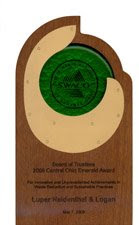Why Sustainability, Why Now?
The role of “Mindset” shifts in the greening of the law
by David Scott
Why does sustainability matter to a law firm? Why do we “all of a sudden” care when, from the time of Hammurabi to dawn of the 21st Century, sustainability was never even an afterthought for most lawyers?
When asked why Luper Neidenthal & Logan cares about sustainability, I usually say something like “it matters to us because it matters to our clients.” This answer is as true as it is oversimplified. Every lawyer knows that your clients want you to understand their business. So, if my client’s business faces challenges due to changing/evolving sustainability considerations, I can better understand those challenges if I have dealt with them myself. But this article is less about the “why,” and more about the “why now?”
The answer to the question “why now” is a bit more complicated and I don’t think that I could respond any more thoughtfully or comprehensively than a forward-thinking consulting firm has already done. Avastone Consulting issued a report called
“Mindsets in Action” to explore the “influence of patterns of the mind, which shape our capacity to understand the world and allow us to take effective action in support of it.” Basically, over the course of the year 2006, Avastone studied ten corporations with diverse revenues (ranging from $1BN to over $100BN annually) that had shown an orientation toward sustainability in various industries, including metals & mining, high tech, foods, pharmaceuticals, industrial & consumer products, textile, and chemicals. The Mindsets in Action report, published in 2007, presents the insights gained through the study.
Instead of forming conclusions, the stated purpose of the report is to be a “catalyst for conversation, exploration and experimentation,” with the goal of helping to create a “sustainable future for people, organizations, and our one planet.” Whatever the reason(s), Avastone concludes, there has been a collective “expansion of consciousness” that has profoundly impacted “interior mindset development.” The Report defines the term “mindsets” as “interior patterns of mind, or frames of reference, from which individuals see sustainability and its importance.” The Report discusses various factors that will dictate the level of success of future sustainability efforts and focuses on “mindsets as a core underlying force for accelerating sustainability gains.”
Avastone concludes that leadership mindsets are the reason why sustainability is on the radar today and leadership is the most crucial factor to continued sustainability gains. Successful leaders in the sustainability arena will be those who attend to both “translation” (framing sustainability in terms that others understand and triggering effective action) and “transformation” (expanding perspectives through an understanding the role of one person, company, and/or industry in a broader, more complex context). Recognizing some inherent tension between Milton Friedman’s school of thought that “the business of business is business,” and the philosophy of corporate social responsibility, Avastone posits that global circumstances may have placed us on the threshold of an entirely “new paradigm for living,” and businesses will either adapt to a new world or be left behind.
In an effort to be consistent and rational, the Report develops five stages of activity (called “Gears”) as “milestones along the business sustainability journey.” The gears range from mere Compliance (Gear 1, the “business of business is business” perspective) to Redesign (Gear 5, large-scale system overhaul). Of all of the businesses surveyed by Avastone, none had fulfilled even Gear 4, though most had aspirations to eventually do so, and none appears to even aspire to Gear 5.
Learning about the deep-seated psychological, economic and social perspectives that have caused the businesses who took part in the Report to adopt a pro-sustainability mindset brings me full circle to why I think sustainability is now starting to matter to lawyers. In this age of the internet facilitating unprecedented communication and sharing of knowledge, we have a greater understanding of how human activities impact the planet and an ever-increasing recognition of how global forces shape our economy. Although we don’t have to look any further than the grocery store or the corner gas station to know that there is only so much oil/food/land/water to go around, it seems like only recently that we’ve been willing and/or able to make significant changes based upon that knowledge.
If, and how much, we’re willing to change is going to be dictated by the evolution of our mindsets. Fear can certainly be a great motivator, but might not lead to the most healthy or productive change. Aspiring to do better seems to have a better likelihood of long-term success. Avastone concludes that we ultimately face “transformation of consciousness” toward “a full and complete call to leadership – to live and fulfill the true nature of our human potential.” I know that it may seem odd for a lawyer to be talking about fulfilling the true nature of our human potential, but who would disagree that many lawyers could benefit from a transformation of consciousness? The point is that every industry has untapped potential and it will be fascinating to see our leaders make themselves known, and if/how those leaders are able to cause transformative development, in the months and years ahead.
Read more!
















